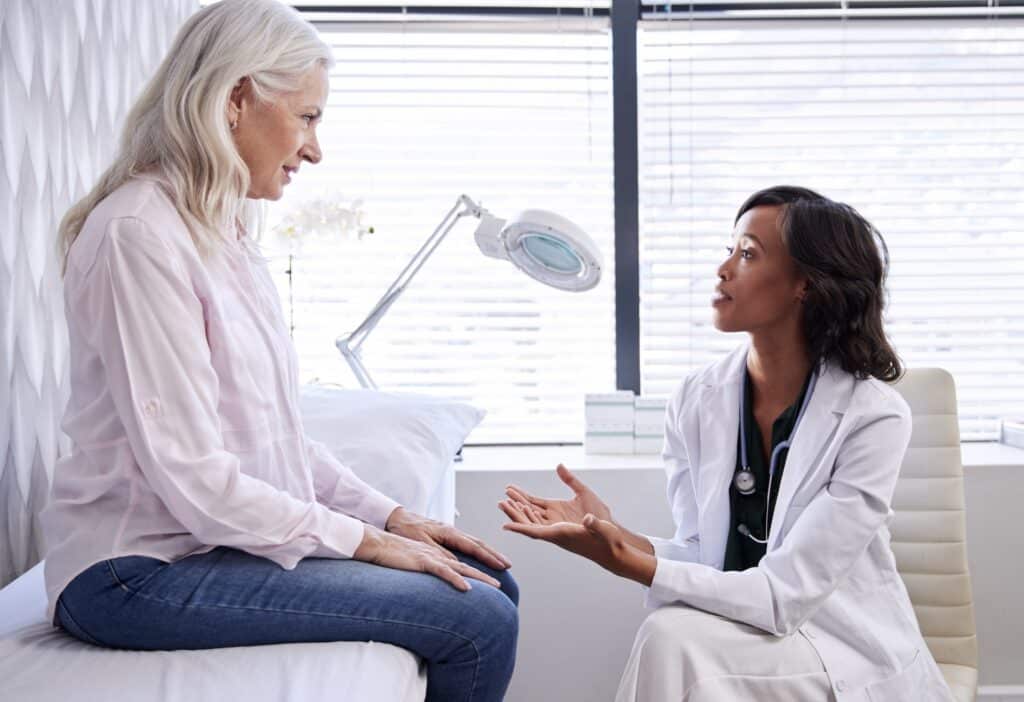Gynecologists in Albuquerque and Roswell, New Mexico
At Lovelace, we provide comprehensive gynecology and urogynecology services to women of all ages. Our team of experts offer treatments for conditions that affect the pelvic floor, bladder, reproductive organs, and bowel. We also offer typical gynecological and women’s health services like birth control counseling, STD testing, pelvic exams, and Pap smears. Whether you’re seeking screening services to stay ahead of your health or need treatment for a pelvic floor disorder, our team is here to offer exceptional you can depend on.

Our gynecology services
Our women’s health specialists and gynecology experts provide a wide range of services, including:
- Adolescent health services
- Annual exams
- Birth control counseling
- Breast and pelvic exams
- Cervical LEEP procedures
- Colposcopic examinations
- Endometrial biopsies
- Family planning services
- Hormone replacement
- Infertility treatment
- Menopause treatment
- Pap smears
- Pre-conceptual counseling
- Prenatal care
- School and work physicals
- Sexual dysfunction treatment
- STD testing and care
- Surgical procedures
- Treatment for PMS
- Ultrasounds
To schedule an appointment or learn more about our services, please call 505-727-2727.
Urogynecology services
Urogynecology is a medical specialty that combines gynecology and aspects of urology to address dysfunctions of the pelvic floor, which can affect the bladder, reproductive organs and bowel. We strive to improve the quality of life for women suffering from these disorders by using minimally invasive techniques, when possible. Our board-certified urogynecology team diagnoses and treats pelvic floor disorders, including pelvic organ prolapse, urinary incontinence, voiding dysfunction, and accidental bowel leakage.
The most common symptoms of a urogynecological condition includes:
- A bulge or something visibly coming out of the vagina
- Feeling an urgent or frequent need to urinate
- Having a hard time going to the bathroom or emptying your bladder completely
- Having frequent urinary tract infections
- Heaviness, fullness, pulling or aching in the vagina that is worse at the end of the day or during a bowel movement
- Leaking when you cough, laugh or exercise
Addressing symptoms and regaining the quality of life you deserve may involve several treatment options, such as:
- A vaginal pessary, which is a plastic device inserted into the vagina to help support the pelvic organs and relieve the symptoms of incontinence
- In-office procedures to treat overactive bladder, urgency incontinence, and stress incontinence
- Medication to treat urinary urgency incontinence, chronic constipation or diarrhea
- Minimally invasive surgery to support the organs that have dropped
- Recommendations for lifestyle or dietary modifications to reduce the causes of urinary incontinence
- Referrals for physical therapy to strengthen, relax or better coordinate the muscles of the pelvic floor
Our team will work with you to find the best options for you and your symptoms. Please note that a referral from a provider is required to make an appointment. To learn more or to schedule an appointment, please call 505-727-7200.
Pelvic organ prolapse
Pelvic organ prolapse occurs when muscles and ligaments supporting the pelvic organs weaken, allowing the pelvic organs to slip from their normal position, creating a bulge in the vagina. Severe prolapse can cause the uterus to slip partially into the vagina and may cause the upper part of the vagina to sag into the vaginal canal or even outside of the vagina.
Some women with prolapse experience symptoms such as the feeling of sitting on a ball, pulling in the pelvis, pelvic or abdominal pain, painful intercourse, protrusion of tissue from the vagina, bladder infections or frequent urination. Prolapse is common and can be caused by pregnancy and childbirth, aging, obesity, chronic cough, chronic constipation or heavy lifting. Typically, pelvic prolapse worsens over time, but can be corrected by various surgical or non-surgical options.
Urinary incontinence
Involuntary leakage of urine due to loss or weakened voluntary control of the urinary sphincter is referred to as urinary incontinence. Approximately 13 million Americans suffer from urinary incontinence, which occurs more often in women than men. The main symptom is the involuntary release/leakage of urine. When and how this occurs depends on the type of urinary incontinence. The two most common types are stress incontinence and urge incontinence, and these conditions can be caused by a number of factors, including:
- Pregnancy or childbirth
- Menopause – when estrogen levels drop, the muscles may get weaker
- Hysterectomy or other surgical procedures
- Age
- Obesity
- Intercourse
There are a few important differences between these urogynecological conditions.
Overactive Bladder refers to the leakage that happens when physical pressure is placed on your bladder. Such causes include sudden coughing, sneezing, laughing, heavy lifting or exercise.
Stress Incontinence refers to the leakage that happens when physical pressure is placed on your bladder. Such causes include sudden coughing, sneezing, laughing, heavy lifting or exercise.
Urge Incontinence refers to the leakage that happens when physical pressure is placed on your bladder. Such causes include sudden coughing, sneezing, laughing, heavy lifting or exercise.
If you have any of these conditions, the urogynecologists at Lovelace are here to provide expert care tailored to your needs. Call us to learn more about our treatments, or schedule an appointment today.
